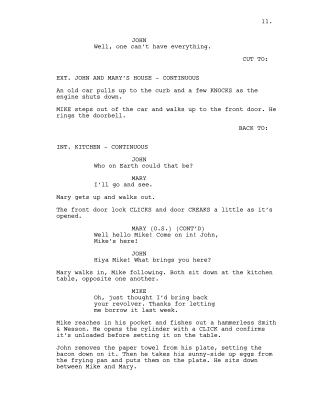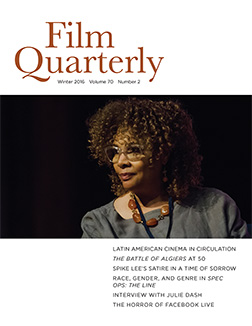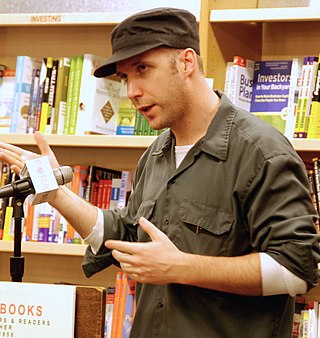Related Research Articles
Formalist film theory is an approach to film theory that is focused on the formal or technical elements of a film: i.e., the lighting, scoring, sound and set design, use of color, shot composition, and editing. This approach was proposed by Hugo Münsterberg, Rudolf Arnheim, Sergei Eisenstein, and Béla Balázs. Today, it is a major approach in film studies.
Film theory is a set of scholarly approaches within the academic discipline of film or cinema studies that began in the 1920s by questioning the formal essential attributes of motion pictures; and that now provides conceptual frameworks for understanding film's relationship to reality, the other arts, individual viewers, and society at large. Film theory is not to be confused with general film criticism, or film history, though these three disciplines interrelate.
Andrew Sarris was an American film critic. He was a leading proponent of the auteur theory of film criticism.

A screenplay writer is a writer who practices the craft of screenwriting, writing screenplays on which mass media, such as films, television programs and video games, are based.

Logan's Run is a science fiction novel by American writers William F. Nolan and George Clayton Johnson. Published in 1967, the novel depicts a dystopic Malthusian future society in which both population and the consumption of resources are maintained in equilibrium by requiring the death of everyone reaching the age of 21. The story follows the actions of Logan, a Sandman charged with enforcing the rule, as he tracks down and kills citizens who "run" from society's lethal demand—only to end up "running" himself.
French New Wave is a French art film movement that emerged in the late 1950s. The movement was characterized by its rejection of traditional filmmaking conventions in favor of experimentation and a spirit of iconoclasm. New Wave filmmakers explored new approaches to editing, visual style, and narrative, as well as engagement with the social and political upheavals of the era, often making use of irony or exploring existential themes. The New Wave is often considered one of the most influential movements in the history of cinema.

Film studies is an academic discipline that deals with various theoretical, historical, and critical approaches to cinema as an art form and a medium. It is sometimes subsumed within media studies and is often compared to television studies.

Screenwriting or scriptwriting is the art and craft of writing scripts for mass media such as feature films, television productions or video games. It is often a freelance profession.
The Columbia University School of the Arts is the fine arts graduate school of Columbia University in Morningside Heights, New York. It offers Master of Fine Arts (MFA) degrees in Film, Visual Arts, Theatre and Writing, as well as the Master of Arts (MA) degree in Film Studies. It also works closely with the Arts Initiative at Columbia University (CUArts) and organizes the Columbia University Film Festival (CUFF), a week-long program of screenings, screenplay, and teleplay readings.

Thomas Frank Mankiewicz was an American screenwriter, director, and producer of motion pictures and television whose credits included James Bond films and his contributions to Superman: The Movie (1978) and the television series Hart to Hart. He was the son of Joseph Mankiewicz and nephew of Herman Mankiewicz.

Film Quarterly, a journal devoted to the study of film, television, and visual media, is published by University of California Press. It publishes scholarly analyses of international and Hollywood cinema as well as independent film, including documentary and animation. The journal also revisits film classics; examines television and digital and online media; reports from international film festivals; reviews recent academic publications; and on occasion addresses installations, video games and emergent technologies. It welcomes established scholars as well as emergent voices that bring new perspectives to bear on visual representation as rooted in issues of diversity, race, lived experience, gender, sexuality, and transnational histories. Film Quarterly brings timely critical and intersectional approaches to criticism and analyses of visual culture.
Paul Edward Dehn was a British screenwriter, best known for Goldfinger, The Spy Who Came in from the Cold, Planet of the Apes sequels and Murder on the Orient Express. Dehn and his partner, James Bernard, won the Academy Award for Best Story for Seven Days to Noon.

Michael Arndt is an American screenwriter. He is best known as the writer of the films Little Miss Sunshine (2006), Toy Story 3 (2010), and Star Wars: The Force Awakens (2015).

Dreams on Spec is a 2007 American documentary film that profiles the struggles and triumphs of emerging Hollywood screenwriters. It was written and directed by Daniel J. Snyder, who learned first-hand about the screenwriter's travails in the late 1980s when he was a teenager working alongside aspiring writer/directors Quentin Tarantino and Roger Avary in the famed Video Archives video store in Manhattan Beach, California.
Cinephilia is the term used to refer to a passionate interest in films, film theory, and film criticism. The term is a portmanteau of the words cinema and philia, one of the four ancient Greek words for love. A person with a passionate interest in cinema is called a cinephile, cinemaphile, filmophile, or, informally, a film buff. To a cinephile, a film is often not just a source of entertainment as they see films from a more critical point of view.
An auteur is an artist with a distinctive approach, usually a film director whose filmmaking control is so unbounded and personal that the director is likened to be the "author" of the film, thus manifesting the director's unique style or thematic focus. As an unnamed value, auteurism originated in French film criticism of the late 1940s, and derives from the critical approach of André Bazin and Alexandre Astruc, whereas American critic Andrew Sarris in 1962 called it auteur theory. Yet the concept first appeared in French in 1955 when director François Truffaut termed it policy of the authors, and interpreted the films of some directors, like Alfred Hitchcock, as a body revealing recurring themes and preoccupations.

Seth Lochhead is a Canadian screenwriter. He is best known for writing the 2011 film Hanna with David Farr.
David Kipen is an author, critic, broadcaster, arts administrator, full-time UCLA writing faculty member and nonprofit bilingual lending librarian. His fiction and nonfiction have appeared in The New York Times, the Los Angeles Times, Alta Magazine, The Atlantic Monthly, OZY.com and elsewhere. Former literature director of the National Endowment for the Arts, he lives in his native Southern California.
Vulgar auteurism is a movement that emerged in early 2010s cinephilia and film criticism associated with championing or reappraising filmmakers, mostly those working in the horror and action genres and whose work has otherwise received little attention or negative reception in the critical mainstream. It became a controversial topic in the cinephile community following the publication of an article in the Village Voice in 2013 and has been described as "a critical movement committed to assessing the 'unserious' artistry of popcorn cinema with absolute seriousness."
Ivan Rogers (1954–2010) was an independent film actor, director and producer. He was also a musician. He appeared to be following in the footsteps of his mentor, fellow Indiana native, Fred Williamson.
References
- ↑ Kipen, David (2006). The Schreiber Theory: A Radical Rewrite of American Film History, p.38. Melville House ISBN 0-9766583-3-X.
- ↑ Kipen, David (2006). The Schreiber Theory: A Radical Rewrite of American Film History, p.37. Melville House ISBN 0-9766583-3-X.
- ↑ Diane Garrett. "Book Review: The Schreiber Theory". Variety, April 15, 2006. Archived May 16, 2008, at the Wayback Machine
- ↑ Michael Fox. "Author! Author! David Kipen Posits a New Auteur Theory". SF360, March 6, 2006. Archived October 6, 2008, at archive.today